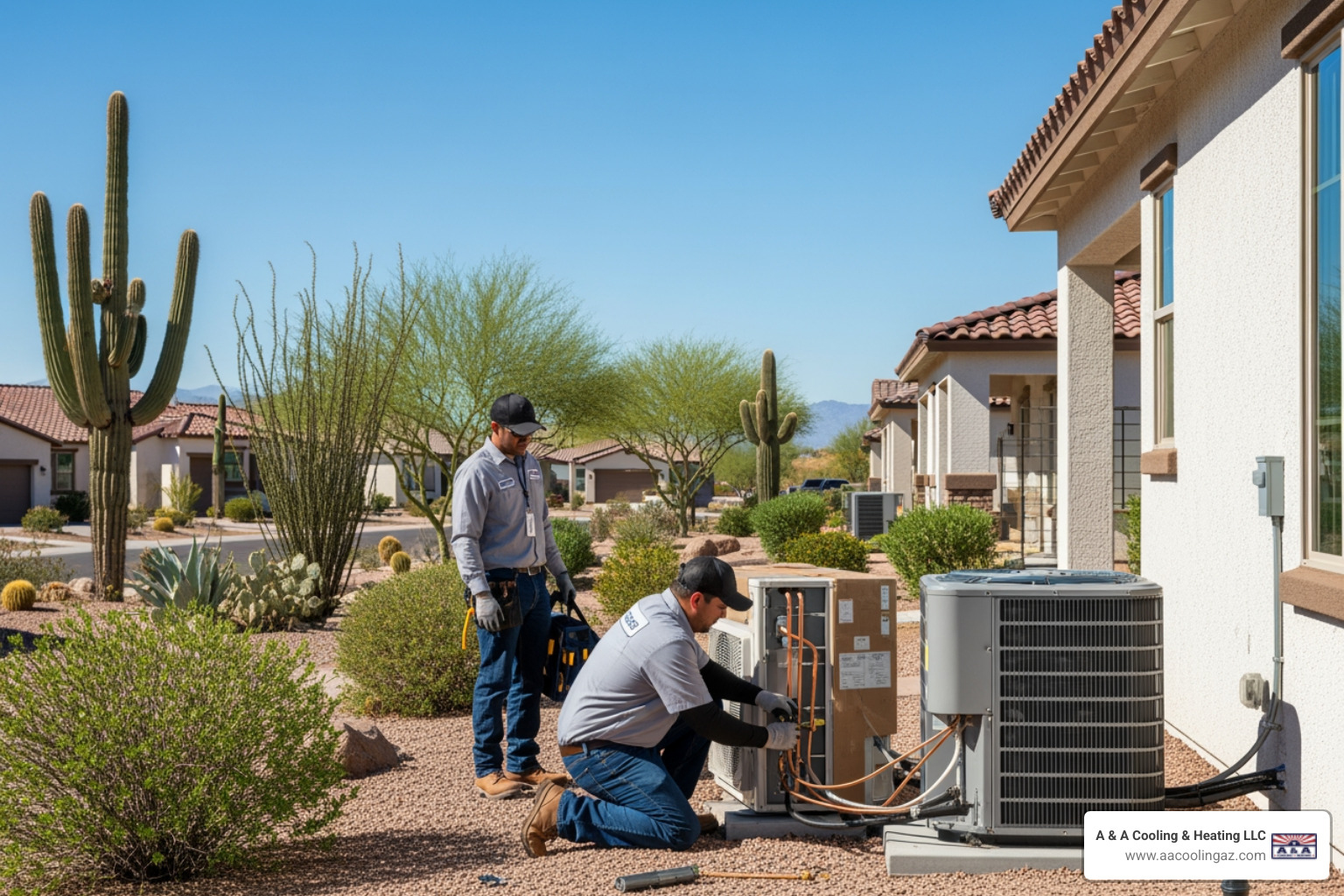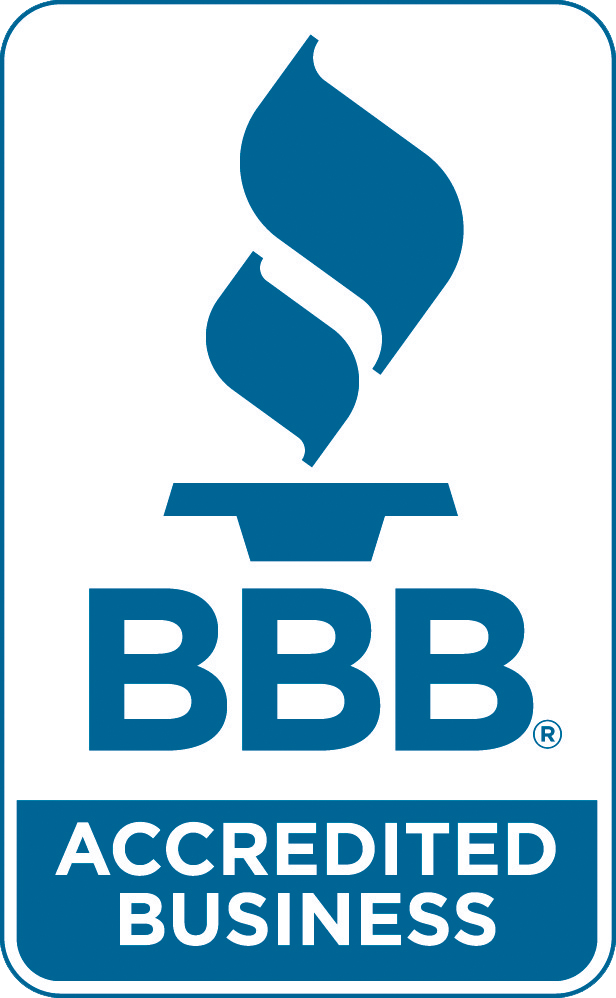Home Sweet Heat: Finding the Perfect Residential Heating Solution

Why Choosing the Right Heating System Matters
Residential heating solutions are the backbone of home comfort during cold months. Since heating accounts for the largest portion of your home's energy use—around 29% in the U.S. and up to 63.6% in Canada—choosing the right system is about efficiency and cost savings, not just warmth.
Quick Answer: Main Types of Residential Heating Solutions
- Furnaces (Forced Air) - Most common in North America; uses ductwork to distribute heated air.
- Boilers (Hydronic) - Heats water for radiators or in-floor systems.
- Heat Pumps - Energy-efficient systems that transfer heat; can reduce electricity use significantly.
- Electric Resistance - Simple baseboard or wall heaters; easy to install but costly to operate.
- Alternative Systems - Wood stoves, pellet burners, and solar heating for specific needs.
Your heating system is an investment. The best choice depends on your climate, home size, infrastructure, and budget. Modern high-efficiency systems can save about 30% on energy bills when paired with proper insulation and air sealing.
In Apache Junction's climate, a reliable heating system is essential for chilly winter nights. Thankfully, today's technology offers more efficient and reliable options than ever.
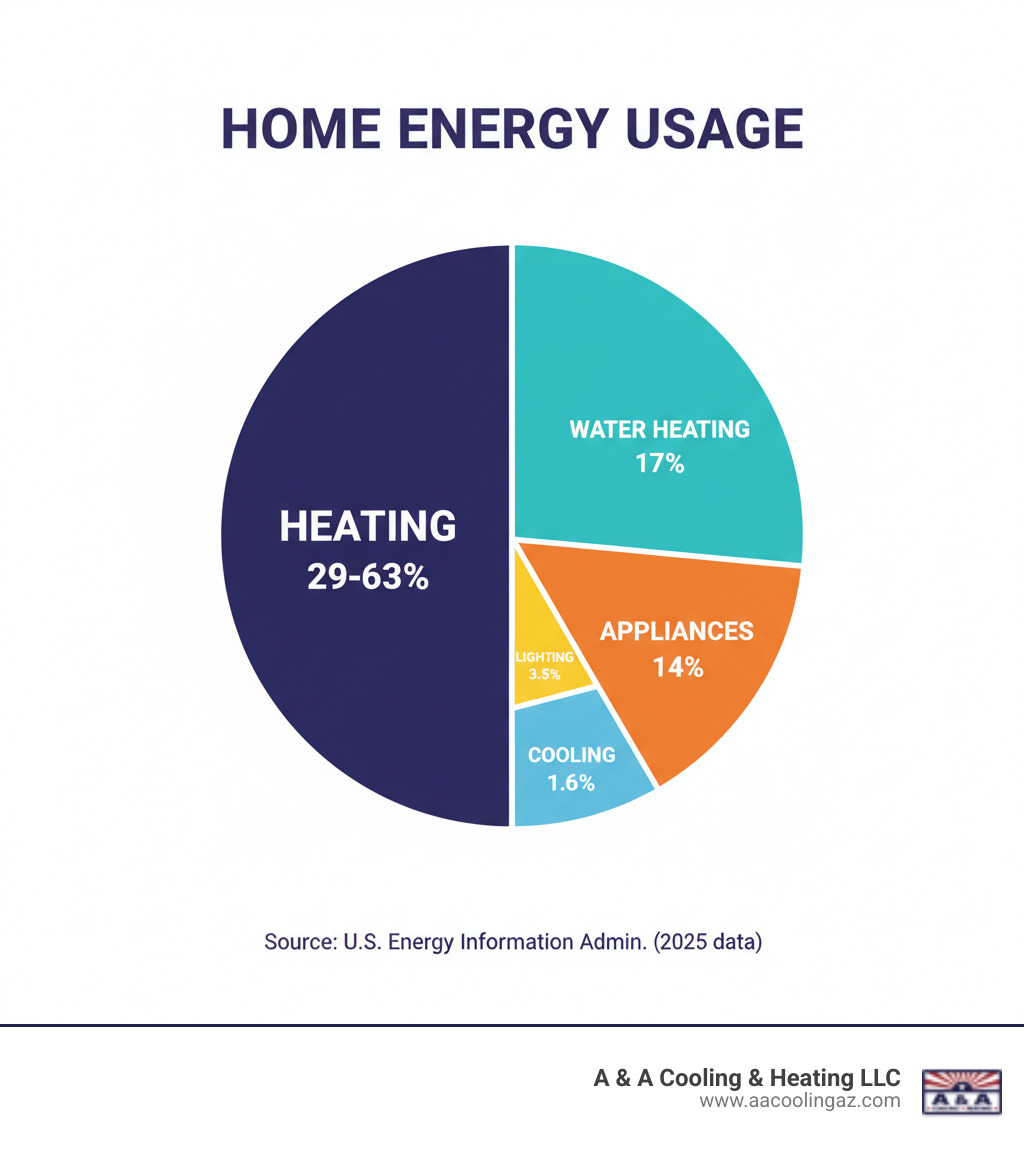
Exploring Common Residential Heating Solutions
Understanding how different residential heating solutions work can help you make smarter decisions about comfort, efficiency, and long-term costs. Let's explore the most common systems found in homes today.
Furnaces (Forced Air Systems)

Furnaces are the most common heating system in North America because they are fast and effective.
How They Work: A furnace heats air by burning fuel (like natural gas or propane) or using electricity to warm a heat exchanger. A blower fan then pushes this heated air through ductwork to warm your home, while return ducts pull cooler air back to be reheated in a continuous cycle.
Natural gas furnaces are the most popular where available. If you don't have gas access, propane furnaces work similarly and propane is a cleaner gas than oil. Some homes still use oil furnaces, while electric furnaces are simple to install but typically cost more to run.
Pros: Furnaces heat your home quickly and integrate with central air conditioning, using the same ductwork. You can also add air filters and humidifiers to the system.
Cons: Installation can be a major project if your home lacks ductwork. The forced air can feel dry, and poorly sealed ducts waste energy.
Boilers (Hydronic Systems)
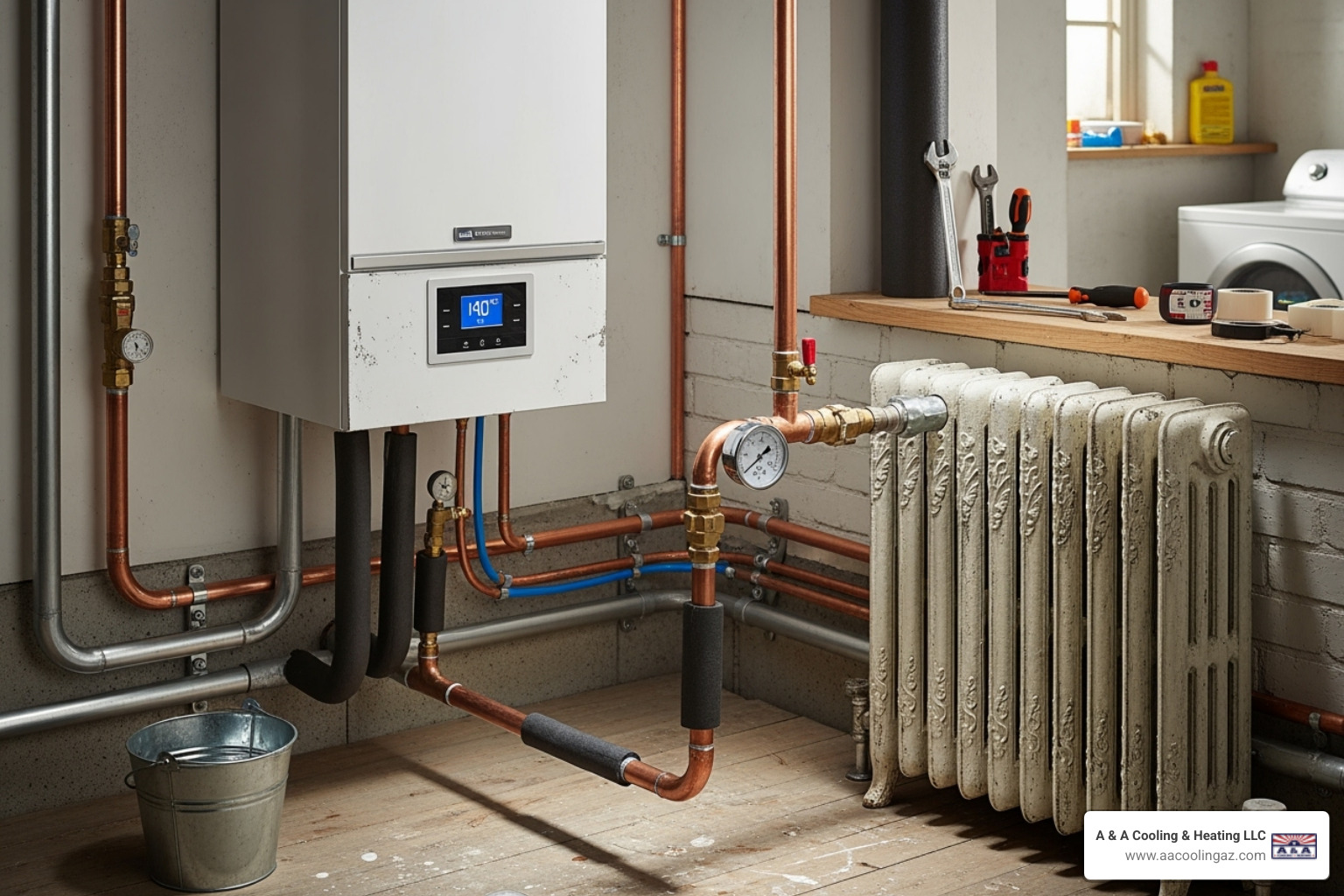
Boilers provide a gentle, even warmth by heating water instead of air.
How They Work: A boiler heats water and pumps it through pipes to radiators, baseboard heaters, or in-floor radiant tubing. The water releases its heat to warm the space and then returns to the boiler to be reheated.
Pros: Hydronic heat is consistent and comfortable, without blowing dust or creating drafts. Boilers operate quietly and can last 20-30 years or more.
Cons: Boilers are slower to heat a cold house and do not provide air conditioning. Installation can be complex, and radiators take up wall space.
Heat Pumps
Heat pumps are the efficiency champions of residential heating solutions, moving heat rather than creating it.
How They Work: A heat pump functions like a reversible air conditioner. In winter, heat pump components pull heat from outdoors to warm the indoors, even when it's cold. In summer, it reverses the process. This method can reduce electricity use for heating by up to 75% compared to electric resistance heat.
Air-source heat pumps are most common, transferring heat between your home and the outside air. Ground-source (geothermal) heat pumps use the earth's constant underground temperature, making them even more efficient but requiring more complex installation. Geothermal heat pumps deliver exceptional long-term performance.
Pros: You get heating and cooling in one highly efficient system, which lowers utility bills and your carbon footprint. They also dehumidify well.
Cons: The upfront investment is higher than for traditional systems. Efficiency can drop in extreme cold, and geothermal installation is complex.
Other Heating Systems
For specific spaces or supplemental warmth, several alternative residential heating solutions are available.
- Electric baseboard heaters are simple to install and control but are expensive to operate as they convert electricity directly into heat.
- Wood and pellet stoves provide warmth and ambiance. They can be economical if fuel is cheap but require storage, loading, and cleaning. A key advantage is that they work during power outages.
- Fireplaces are great for atmosphere but are highly inefficient for heating, as most of the heat escapes up the chimney.
- Solar heating is eco-friendly and can reduce bills in sunny climates like Arizona, but it has high upfront costs and requires a backup system.
Comparing Heating Systems: Efficiency and Performance
When weighing residential heating solutions, understanding efficiency ratings helps you make a smart investment in your home's comfort and long-term energy costs.
Understanding Efficiency Ratings
Efficiency ratings tell you how much energy you're paying for actually becomes heat. Here are the key terms:
- AFUE (Annual Fuel Utilization Efficiency): Applies to furnaces and boilers. A 90% AFUE rating means 90% of the fuel becomes heat for your home.
- HSPF (Heating Seasonal Performance Factor): Rates a heat pump's heating efficiency. A higher number means better efficiency.
- SEER (Seasonal Energy Efficiency Ratio): Measures cooling efficiency for air conditioners and heat pumps. A higher SEER is crucial for hot Arizona summers.
- COP (Coefficient of Performance): Shows how much heat a heat pump delivers per unit of electricity. A COP of 3 means it delivers three units of heat for every one unit of electricity used.
For furnaces and boilers, aim for AFUE ratings above 90%. For heat pumps, look for an HSPF of 8.5 or higher and a SEER of 15 or above.
Energy Efficiency and Operating Considerations
Here's how the major residential heating solutions stack up:
| System Type | Typical Efficiency Range (AFUE/HSPF) | Fuel Source | Best Climate | Pros | Cons |
|---|---|---|---|---|---|
| Furnaces | 80-98% AFUE | Natural gas, propane, oil, electric | Cold climates with established gas infrastructure | Fast heating, familiar technology, works with AC systems | Requires ductwork, can dry out air, potential duct losses |
| Boilers | 80-95% AFUE | Natural gas, oil, electric | Cold climates, homes with existing radiators | Even, comfortable heat, quiet operation, long-lasting | Slower to heat, no cooling option, complex installation |
| Heat Pumps | 7.7-13+ HSPF | Electricity | Moderate to mild climates (cold-climate models available) | Heating and cooling in one, very efficient, reduces carbon footprint | Higher upfront investment, efficiency drops in extreme cold |
Air-Source vs. Ground-Source Heat Pumps
Both heat pump types transfer heat, but they source it differently.
Air-source heat pumps pull heat from the outside air. They are common, versatile, and modern versions work well even in subfreezing temperatures, making them an excellent choice for most Apache Junction homes.
Ground-source heat pumps, or geothermal heat pumps, use the stable temperature of the earth via buried pipes. This makes them even more efficient but involves a more complex and expensive installation. However, their superior efficiency delivers impressive long-term savings that can offset the higher initial investment.
Maximizing Efficiency and Comfort
Once you've chosen from the available residential heating solutions, modern technology and consistent care can lift your system's performance, keeping you cozy while managing energy bills.
Modern Residential Heating Solutions and Technologies
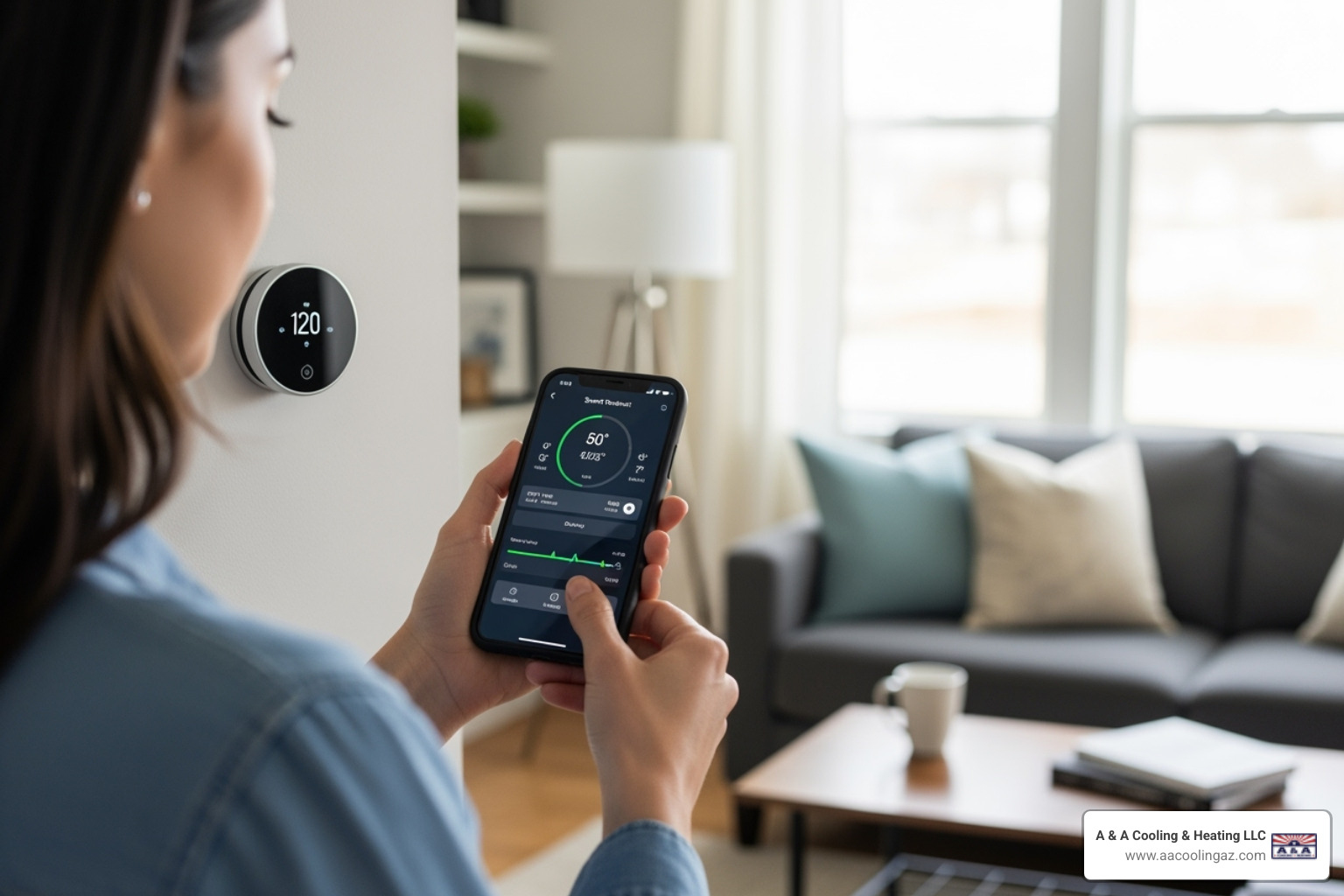
Today's heating innovations make homes more comfortable and efficient.
- Smart thermostats learn your habits and can be controlled remotely via your phone, saving energy by optimizing temperature settings. For heat pumps, it's best to 'set it and forget it,' as they run most efficiently maintaining a steady temperature.
- Ductless mini-split systems are air-source heat pumps without ductwork, perfect for additions or homes without existing ducts. They offer zoned heating and cooling and are highly efficient.
- Zoned heating and cooling allows you to set different temperatures in different areas of your home, saving energy by not heating or cooling unused spaces.
- Hybrid heat systems pair an electric heat pump with a gas furnace, automatically using the most efficient option depending on the outdoor temperature.
The Importance of Regular Maintenance
Even the best heating system requires regular maintenance to perform well. It keeps your system at peak efficiency, lowers energy bills, extends its lifespan, and prevents surprise breakdowns on the coldest nights. Simple tasks like checking your filter monthly are vital, but an annual professional tune-up is the best way to ensure safety and performance.
During a tune-up, a technician inspects all components, cleans the system, and identifies potential issues. For combustion systems like furnaces, these safety checks are essential to test for carbon monoxide leaks and verify that all safety mechanisms are working properly. This isn't just about efficiency—it's about keeping your family safe.
ENERGY STAR and Government Incentives
Programs designed to reward energy efficiency can make upgrading your residential heating solutions more affordable.
When you select energy-efficient products when you buy new heating equipment, look for the blue ENERGY STAR label. These products are independently certified to meet strict efficiency standards, saving you money on utility bills.
Always check for current federal, state, and local rebates. Many utility companies and local governments offer incentives for installing high-efficiency systems. For example, some programs offer substantial rebates for homeowners switching to heat pumps. These incentives can significantly reduce your upfront investment.
At A & A Cooling & Heating LLC, we stay current on all available incentives and rebates in the Apache Junction area to help you maximize your savings.
Frequently Asked Questions about Home Heating
What is the most common type of heating system in North America?
Forced air systems using a central furnace are the most popular residential heating solutions in North America. This is largely due to their versatility, as the same ductwork can be used for central air conditioning, providing a year-round climate control solution that many homeowners in Apache Junction rely on.
How long do typical heating systems last?
The lifespan of a heating system depends on the type and its maintenance history. Here are some general estimates:
- Furnaces: 15 to 20 years
- Boilers: 20 to 30 years or more
- Heat Pumps: 15+ years (ground loops in geothermal systems can last over 50 years)
- Electric Baseboard Heaters & Stoves: 20 to 25 years
The secret to reaching—or exceeding—these lifespans is consistent professional maintenance and proper installation from the start.
Can a new heating system really save me money?
Yes, the savings can be substantial. Since heating is a major part of your utility bill, upgrading to a modern, high-efficiency ENERGY STAR certified model can dramatically reduce energy use. For example, today's heat pumps can cut electricity use for heating by up to 75% compared to electric resistance heating.
When you combine a new, efficient heating system with proper insulation and air sealing—a "whole-house approach"—you can save about 30% on your total energy bill. At A & A Cooling & Heating LLC, we've seen how these upgrades pay for themselves over time through monthly savings.
Conclusion
Finding the right residential heating solutions is about balancing comfort, efficiency, and your budget. There's no single best answer; the ideal system fits your home, climate, and long-term goals. Your heating system is part of a whole-house approach—proper insulation, air sealing, and regular maintenance are essential for it to perform efficiently.
Modern technologies like smart thermostats and zoned heating offer more control than ever, while ENERGY STAR certifications and government incentives make investing in an efficient system more accessible.
Navigating these options can feel overwhelming. That's where professional guidance makes all the difference. At A & A Cooling & Heating LLC, we've been helping Apache Junction homeowners find their perfect heating solutions since 1976. We understand the local climate, know which systems perform best here, and are committed to helping you make the right choice for your home and family.
Our team can assess your home's needs, explain your options clearly, and provide expert installation and maintenance to keep your system running at peak performance for years to come.
Ready to find your ideal heating solution? Contact our team for professional heating and cooling services in Apache Junction. We'll help you find the perfect balance of comfort, efficiency, and value for your home.









